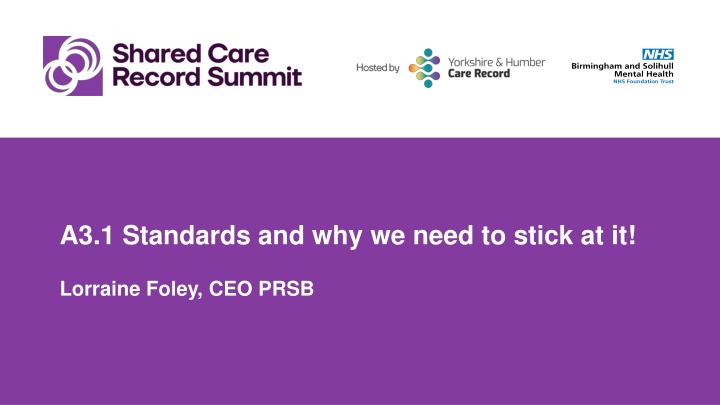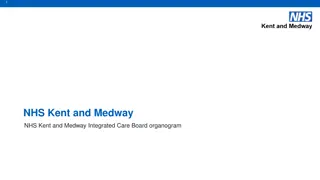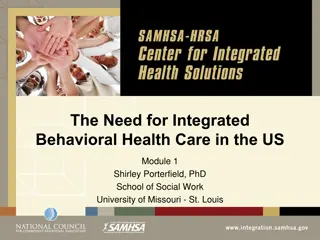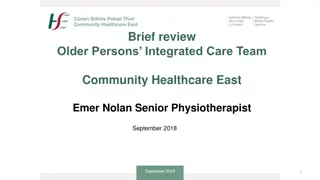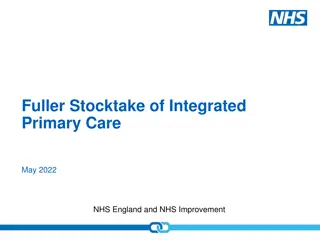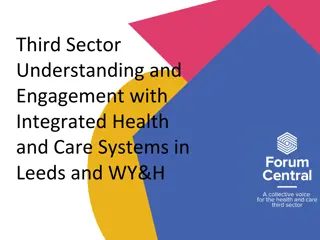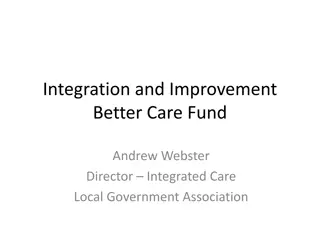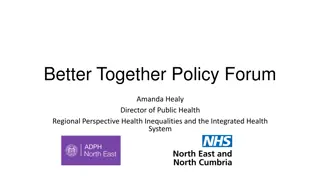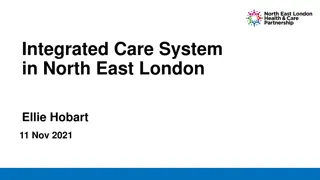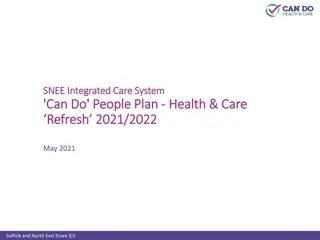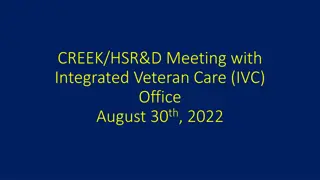Why Standards Matter for Integrated Care
Standards play a crucial role in achieving integrated care by ensuring standardized data, improving safety and data quality, fostering innovation, and enabling seamless integration of shared care records. Despite the challenges in implementation, progress in key areas like diabetes, maternity, and social care highlights the importance of adhering to standards for better care outcomes and enhanced collaboration among healthcare stakeholders.
Download Presentation

Please find below an Image/Link to download the presentation.
The content on the website is provided AS IS for your information and personal use only. It may not be sold, licensed, or shared on other websites without obtaining consent from the author.If you encounter any issues during the download, it is possible that the publisher has removed the file from their server.
You are allowed to download the files provided on this website for personal or commercial use, subject to the condition that they are used lawfully. All files are the property of their respective owners.
The content on the website is provided AS IS for your information and personal use only. It may not be sold, licensed, or shared on other websites without obtaining consent from the author.
E N D
Presentation Transcript
A3.1 Standards and why we need to stick at it! Lorraine Foley, CEO PRSB
Why this matters "For parent carers like myself, the About Me standard is the difference between care staff giving essential care and excellent, personalised-care, that sees the person for the individual they are." Sam Goncalves, parent and carer "Access to the community mental health team s notes for patients with serious mental illness has been a game-changer. I can now tailor my support to complement specialist teams plans, which has improved outcomes for patients and allowed me to provide more effective therapeutic care." Dr Nilesh Bharakhada, GP, NW London A big part of being able to implement care planning across multiple ICSs at pace has been aligning to a common understanding of the clinical data to be captured and shared. As a PRSB partner, we can further our collaboration with clinical experts that are curating these standards and validate our assessments of compliance to the standards. Ian Bennett, product specialist at Better
Standardised data the golden thread Safety and data quality Innovation, insight and prevention Integration and shared care records
Delivering on the promise of integrated care Getting the basics of information right is just the beginning. As a health and care system we should aspire to use information to make the shift from reactive services to predictive and preventative services Lyn Romeo, Chief Social Worker (England)
Why is it so hard to achieve? Hard Harder Hardest Getting everyone to agree Changing software Changing clinical pathways and working practices We need national consensus and genuine buy-in from all Getting suppliers on board, legacy systems, procurement, incentives Changing clinical pathways and working practices
Important progress in standards and spread CIS V3 Core Information Standard uplift Common model to underpin standards for care, research and FDP Important standards in key areas diabetes, maternity, social care Pilots, SNOMED, templates Standards easier to implement 1 st 72 Partners Provider conformant with Pers. Care and Support Plan >40 Conformant Direct support to implement
Correcting common misunderstandings The international patient summary is an easier alternative to the Core Information Standard PRSB standards are large and unwieldy, difficult to implement PRSB standards are not internationally based The technical message formats are enough on their own It is hard for local organisations to exert any control and influence suppliers/ the system
Meeting the requirements for conformance Minimum safe implementation (MVIS) The best practice standard (Core Information Standard) 149 items 18 business rules 1,842 items 40 business rules
International Patient Summary and CIS Ambulance GP Pharmacy Communityy Care home Hospital Hospice Mental Health 111 The Shared Care Record is a comprehensive but constrained set of data for sharing with only the data relevant for the particular need used at any one time. IPS is a minimal set of basic clinical data of a patient, usable by all clinicians for unscheduled (cross-border) patient care. Mental health
Relationship to international standards PRSB core reference model: PRSB represented on BSI IST35 and takes account of CEN and ISO standards such as ISO 13606, CONTSYS and the International Patient Summary Information record standards: our discovery work for any standards includes consideration of any international models for similar use cases or for reference architecture e.g. diabetes was informed by i. international consensus on time in range ii. International literature on insulin pumps/pens (not standard but peer reviewed papers iii. iCode US standard for Continuous Glucose Monitors Terminology: SNOMED CT and dm+d using international and UK extension FHIR: PRSB has worked closely with national efforts to establish HL7 FHIR UK profiles - both with NHS Digital / England, and the wider FHIR UK Core initiative. International Suppliers: PRSB works with international suppliers (EPIC, Cerner etc) in the Partner Programme, and also through INTEROPen, techUK and CASPA making the case for international standards alignment UK has made substantial advances and have the opportunity to be influencing/setting international standards as well as following them where an appropriate standard exists
We need the right water in the pipes PRSB s information record standard ensures the right water is in the pipes before it is distributed around the system. We need the water and the pipes to be right for interoperability to be successfully achieved.
Why is evidence of conformance important? PRSB s information record standard ensures the right water is in the pipes before it is distributed around the system. Standards should be testable and tested Conformance assurance provides predictability and trust Suppliers can be clear when they have done enough We need the water and the pipes to be right for interoperability to be successfully achieved. A conformant system makes implementation more straightforward Health and care systems need consistent implementation of standards Removes the fear and uncertainty from buying clinical software A learning health system data, evidence, practice
PRSB Partners PRSB s information record standard ensures the right water is in the pipes before it is distributed around the system. We need the water and the pipes to be right for interoperability to be successfully achieved. 8/10 EPR suppliers 5/6 ShCR suppliers 50% social care suppliers
Legislation PRSB s information record standard ensures the right water is in the pipes before it is distributed around the system. Health and Social Care Act 2022 Data Protection and Digital Information Bill Applies to public and private health and adult social care providers We need the water and the pipes to be right for interoperability to be successfully achieved. Makes compliance to information standards mandatory Enforcement through financial penalties, public censure and accreditation We don't need to wait for legislation to act
Levers, incentives and legislation Everything goes much faster when everyone is pulling in the same direction.. Peer pressure Supplier market shift Provider demand CQC/regulators ISNs Financial incentives Procurement Legislation/penalties
Thank you Lorraine Foley CEO Professional Record Standards Body info@theprsb.org @ProfRecordSB
